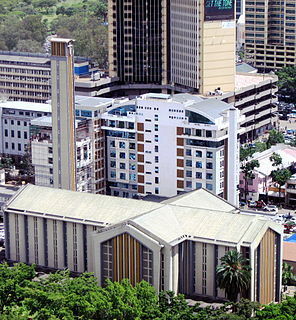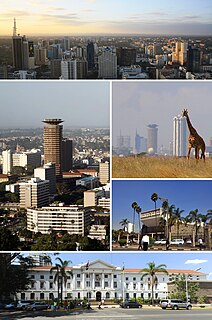Archbishop Emeritus John Njenga was Roman Catholic archbishop of Mombasa Diocese from 1990 to 2005.
The Apostolic Vicariate of Isiolo is a Latin Catholic pre-diocesan jurisdiction in Eastern Province, Kenya.

The Anglican Church of Kenya is a province of the Anglican Communion, and it is composed by 37 dioceses. The current Primate and Archbishop of Kenya is Jackson Ole Sapit.
The Roman Catholic Archdiocese of Kisumu is the Latin Metropolitan See for the Ecclesiastical province of Kisumu in western Kenya.

John Njue is a Kenyan Cardinal of the Roman Catholic Church. He has been the fourth Archbishop of Nairobi since 2007, having previously served as Coadjutor Archbishop of Nyeri (2002–2007) and Bishop of Embu (1986–2002). He was elevated to the rank of cardinal in 2007.

Catholic University of Eastern Africa (CUEA) is a multi-campus university in Kenya.

The Cathedral Basilica of the Holy Family is a Catholic Church Cathedral and Basilica dedicated to the Holy Family located around City Square in Nairobi, the Capital City of the Republic of Kenya. The Basilica is the seat of the Archdiocese of Nairobi.
The Episcopal Conference of Slovakia (ECS), established by the Apostolic See, the Assembly of Catholic Bishops, Slovak Republic, who together perform some pastoral duties for the faithful of the Catholic Church in Slovakia and to provide to people especially the form and manner apostolate, suitably adapted to the circumstances of time and place according to law. ECS was 23 March 1993. The Episcopal Conference of Slovakia is based on the law itself have legal personality . The Slovak Bishops' Conference includes all diocesan bishops of the Slovak Republic and according to their rights on a par with the position, and coadjutor bishops, auxiliary bishops and other titular Bishops who are in that territory or outside it perform a specific task entrusted to them the Apostolic See or the Episcopal Conference of the common good of the country . Members of the Slovak Bishops 'Conference as well as Diocesan Bishops and their rights under par for the position, and coadjutor bishops, auxiliary bishops of the Byzantine rite in the Slovak Republic belonging to another Bishops' Conference. Emeritus Bishops are not members of the Episcopal Conference of Slovakia, but may be invited as consultors of several plenary sessions and to be members of some episcopal commissions. Slovak Bishops' Conference are: Plenary Session, the Permanent Council General Secretariat, Council for Economic Affairs and the Committee and the Conference Board provided for a defined purpose . (Statute of the Slovak Bishops' Conference adopted on 21 6th 2000, Art. 1 to 4).
The Spanish Episcopal Conference (SEC) is an administrative institution composed of all the bishops of the dioceses of Spain, in communion with the Roman Pontiff and under his authority. Its purpose is the joint exercise certain pastoral functions of the episcopate on the faithful of their territory, under common law and statutes, in order to promote the life of the Church, to strengthen its mission of evangelization and respond more effectively to the greater good that the Church should seek to men.

The Venezuelan Episcopal Conference (CEV) is a permanent institution. Its stated aim is, according to Second Vatican Council, associated with the Bishops of the Republic to exercise together, as an expression of collegial spirit, certain pastoral functions on the faithful of their territory and to promote according to the rule of law, the greater good which the Catholic Church offers humankind, especially through forms and programs of the apostolate fittingly adapted to the circumstances of time and place.
The Regional Episcopal Conference of Francophone West Africa is an agency of the Catholic Church which includes the bishops of Western Africa.
The Association of Member Episcopal Conferences in Eastern Africa (AMECEA), the Association of Episcopal Conferences of Eastern Africa and the coordinating body of the Catholic dioceses. The AMECEA was established in 1961. Was the founding president of the Cardinal Archbishop of Lusaka Adam Kozlowiecki, SJ. It is one of ten members of the Symposium of Episcopal Conferences of Africa and Madagascar(SECAM).
The bishops met in the local Episcopal Conference of Tanzania. Founded in 1956, the Episcopal Conference was officially recognized by the government in 1957. It includes all the Catholic bishops of the country, ordinary, and auxiliary emeritus. Its headquarters is located in the capital Dar es Salaam. The statutes of the Conference were approved by the Holy See on January 8, 1980. The TEC is a member of the Association of Member Episcopal Conferences in Eastern Africa (AMECEA) and Symposium of Episcopal Conferences of Africa and Madagascar (SECAM). The TEC consists of the following institutions: the Plenary Assembly, the Permanent Council, the Secretary-General, eight departments, three research units, eight commissions. The authority and responsibility for managing the activities of TEC are granted Plenary Assembly, composed of all members, which meets once a year and is chaired by the President of the Conference. The management of the TEC is instead assigned to the Permanent Council, assisted by the Secretariat General. The Permanent Council is composed of the President of the Presiding Bishop of TEC and the Departments of TEC. Duties of the Secretary General are to organize the work of the Plenary Assembly, to implement its decisions, to liaise between the dioceses of the country. The TEC is then composed of eight departments, three units and eight Commissions.
The local assembly of bishops is the Episcopal Conference of the Côte d'Ivoire. Founded in 1970, the Episcopal Conference has been officially recognized on February 16, 2007 by the Ivorian state. It includes all the Catholic bishops of the country, ordinary, and auxiliary emeritus. It has its headquarters in Abidjan.
The local assembly of bishops is the Episcopal Conference of Burkina Faso and of Niger. Its purposes are to coordinate and make dynamic pastoral activities of the Catholic Church in the nations of Burkina Faso and Niger for the good of the faithful, and encourage the sharing of resources and people for a common assumption evangelizing mission of the church in the two countries.
The bishops of Cameroon are the National Episcopal Conference of Cameroon. The origins date back to the missionaries of the Episcopal Conference. In fact, the missionaries were the first to Pallottines feel the need to meet to discuss issues related to the evangelization of the country. The CENC is a member of the Association of Regional Conferences of the Region of Central Africa and Symposium of Episcopal Conferences of Africa and Madagascar (SECAM).
The local assembly of bishops is the Episcopal Conference of Malawi, established in 1966. Constituent bodies of the ECM are: the plenary assembly of bishops, the Catholic Secretariat and six committees . The ECM is a member of the Association of Member Episcopal Conferences in Eastern Africa (AMECEA) and Symposium of Episcopal Conferences of Africa and Madagascar (SECAM).
Philip Anyolo is a Kenyan Roman Catholic bishop. He was ordained priest for the Catholic Diocese of Eldoret, Kenya, on October 15, 1983. Pope John Paul II appointed Philip Anyolo as Bishop of the Roman Catholic Diocese of Kericho on December 6, 1995. He was consecrated as bishop in Kericho on February 3, 1996. Anyolo served as the Ordinary of the Catholic Diocese of Kericho, Kenya, until March 22, 2003.









